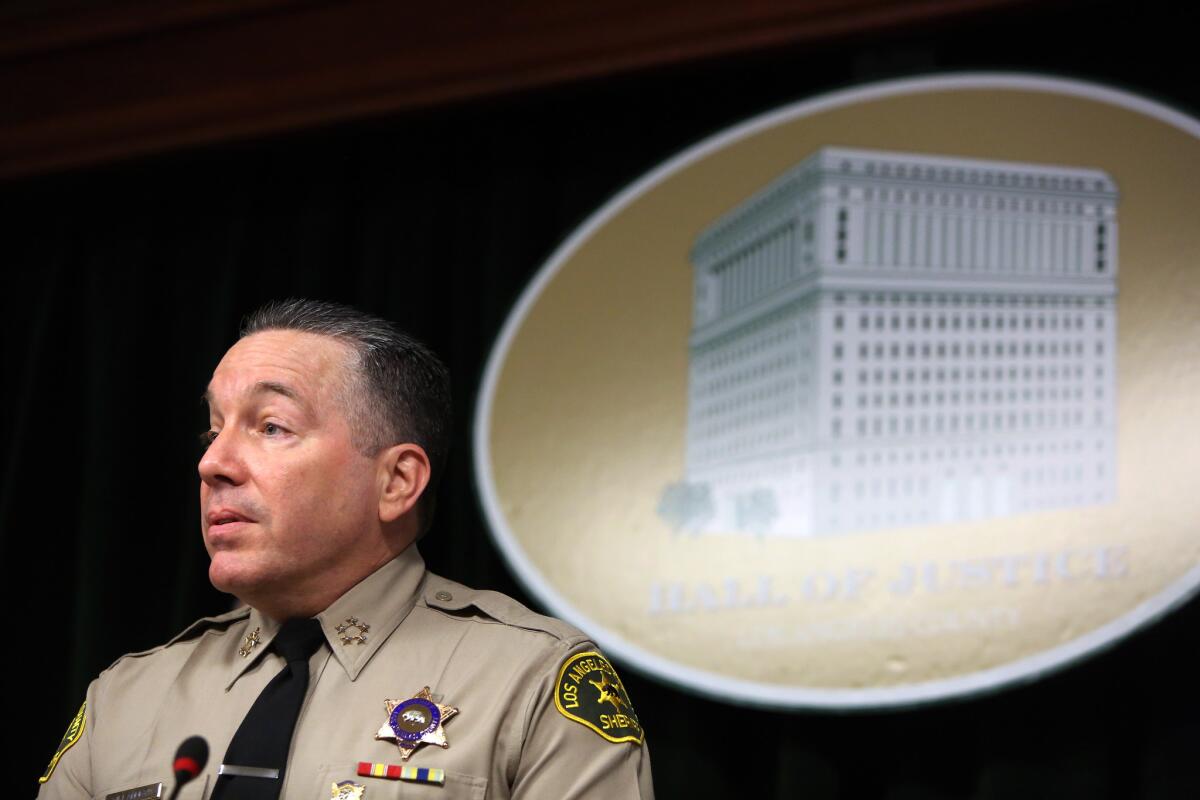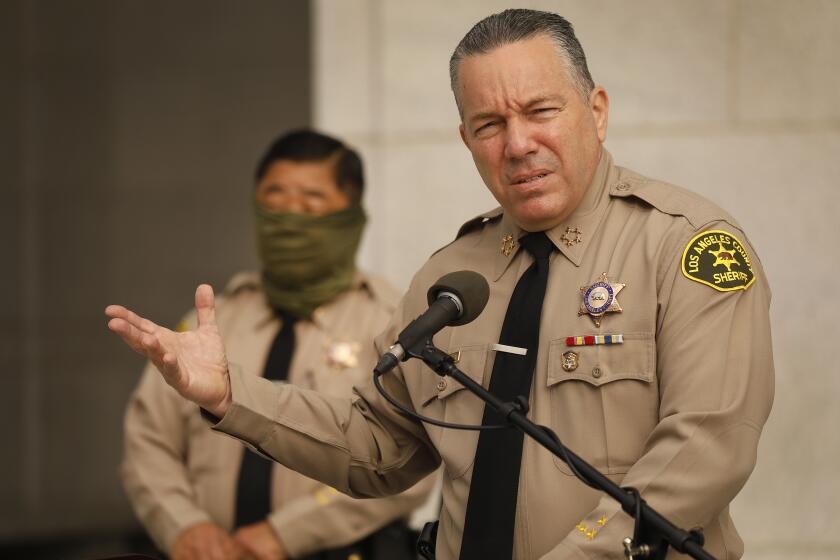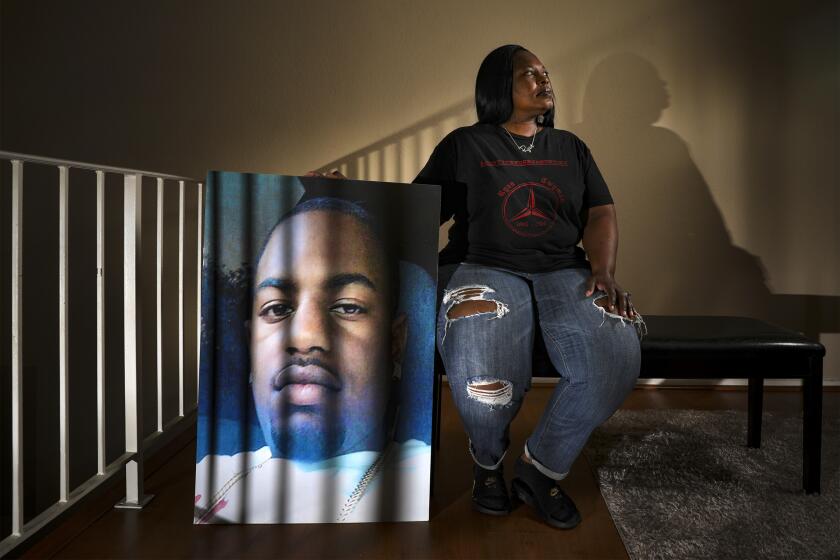Column: The more smack California sheriffs talk, the more they’re asking to be handcuffed

- Share via
There seems to be no low to which sheriffs in California won’t stoop to fight off even a modicum of oversight.
The latest example, of course, comes from L.A. County’s very own Alex Villanueva. Apparently irked by Supervisor Hilda Solis, who recently dared to point out the obvious, saying that law enforcement engages in clear patterns of race-based brutality, the sheriff questioned whether she was trying to create distrust between his department and the community.
Never mind that one of his deputies shot a Latino teenager, Andres Guardado, five times in the back last month and the sheriff is refusing to release any information.
“I don’t know,” Villanueva said of Solis, streaming live on Facebook. “Are you trying to earn the title of a La Malinche? Is that what it is?”
A “La Malinche”? SERIOUSLY?! You are calling a county supervisor a TRAITOR?
But you know what? I’m calm. And you should be too. Because as appalling as it is that Villanueva would level a sexist slur at Solis, the more smack he and other California sheriffs talk — whether it’s in refusing the public’s demands for transparency or the governor’s demands to enforce his face-mask mandate — the more reasons they’re giving the state to rein them in.
In the latest flare-up in his feud with county officials, Sheriff Alex Villanueva refers to Supervisor Hilda Solis as “La Malinche,” a name historically used in Mexico to demean a woman as a traitor or sellout.
Because sitting on deck in the California Legislature, which returned to session this week, is AB 1185. Authored by Assemblyman Kevin McCarty (D-Sacramento), it would let counties establish an oversight board or an office of inspector general, and then give them true investigatory powers with the ability to issue subpoenas. Witnesses, including deputies, could be called to testify and sheriff’s departments would have to turn over documents.
In short, AB 1185 would mean that sheriffs can no longer just blow off outside oversight anytime they see fit. And in counties, such as L.A., where an oversight board and inspector general’s office already exist and have subpoena power, it would bolster the authority of both.
“We’re saying that the sheriff needs to respect that,” McCarty said. “He can’t ignore information requests.”
Because that’s exactly what has been happening.
Villanueva, for example, put a “security hold” on information related to the shooting of Guardado because, he said, there’s an ongoing investigation. It’s only because the family commissioned an independent autopsy and because Chief Medical Examiner-Coroner Dr. Jonathan Lucas correctly saw the need for transparency that we know the 18-year-old was shot in the back in Gardena on June 18.
In response to the disclosure, the sheriff issued a petulant statement that both missed the point and confirmed why the public has no reason to trust his department.
“Dr. Lucas has acknowledged succumbing to pressure from the Board of Supervisors and the Office of Inspector General,” Villanueva wrote, “and has now made the astonishing admission that he sacrificed the integrity of the investigation in a bid to satisfy public curiosity.”
In an even more ridiculous stunt, Sacramento County Sheriff Scott Jones locked the county’s then-inspector general, Rick Braziel out of his department, revoking all access to records and personnel and effectively bringing all independent investigations to a halt. The reason? Because the inspector general wrote a report that criticized deputies for engaging in a foot chase with a mentally ill Black man, Mikel McIntyre, and shooting wildly amid traffic on a freeway until they killed him.
In that case, the Board of Supervisors felt powerless to do just about anything to force the sheriff to comply.
For families who have lost loved ones to police violence, the killing of George Floyd tears at old wounds and compels them to speak of those they’ve lost.
That also was the case for the supervisors in rural Trinity County in 2018, when then-Sheriff Bruce Haney moved six hours away to Oregon and stopped coming to work — while continuing to collect his salary and benefits, of course — because he got mad over the way the board wanted to enforce cannabis regulations.
“I was wondering a while back, how do you hold this gentleman accountable when he’s an elected official?” County Supervisor Terry Mines told the Sacramento Bee at the time. “How does it work? Can I get elected for a four-year term and just walk away and collect?”
For these reasons and more, AB 1185 is a bill that’s long overdue in California. And there’s even more urgency given the renewed demands to root out systemic racism in the criminal justice system in the wake of George Floyd’s death in Minneapolis.
Elected sheriffs, whose powers come from the California Constitution, aren’t like police chiefs, who are appointed and take direction from mayors, city councils and city managers.
It’s this difference, and that of cities being more liberal and counties being more conservative, that has played out in reform efforts up until now. While sheriffs, by and large, have resisted calls for more transparency and accountability, dragging their feet on things such as body cameras, police departments across the state have generally moved faster to adopt such tools and change their policies to meet the needs of the moment.
That, under current state law, the lines of authority are so murky between sheriffs and boards of supervisors has only made implementing needed reforms more challenging — and clearly, in the case of Los Angeles County, contentious. That can’t continue.
“I think what we’ve seen in your county in Sacramento is sometimes our sheriffs say, ‘Hey, you know, my oversight is called an election every four years.’” McCarty said. “And I think what I’m saying, what we’re saying, is no.”
It’s enough to make me wonder why we elect sheriffs at all.
More to Read
Sign up for Essential California
The most important California stories and recommendations in your inbox every morning.
You may occasionally receive promotional content from the Los Angeles Times.













